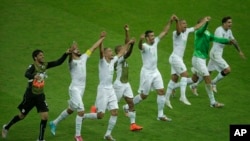Rashid Magid was elated when Algeria made it to the knockout phase of the World Cup by drawing with Russia.
“I really feel so happy for this game... it was so fantastic," the 21-year-old South Sudanese soccer fan said after the match ended in what for viewers in Juba were the early hours of Friday.
"I still believe Algeria can do something," said Magid, who, by rights, shouldn't have been watching the match at all because he has to go to a local cinema to see it (he has no electricity at home) and kick-off was at 11 pm, local time -- just as Juba's nightly curfew began.
But Magid is one of many football fans in South Sudan who have been venturing out into the night and violating the curfew to watch World Cup matches being played in distant Brazil.
If they were caught, these diehard football aficionados risk being detained and fined an unspecified amount -- exactly how much depends on the arresting officer.
But they're likely to continue taking the risk because, for the first time in history, Africa has two teams in the last 16 of the World Cup. The other one is Nigeria, which finished second in its group, behind soccer powerhouse, Argentina.
President Kiir imposed a curfew in Juba when violence erupted in mid-December. It used to start at 6 pm and run until dawn, but was moved to 11 pm a few months ago.
Matches that start in the middle of the afternoon in Brazil end just before dawn in Juba, well into the hours that no one is supposed to be out and about in the South Sudan capital.
Curfew cops turn blind eye
But football fan John Buksar has been ignoring the curfew and walking one kilometer to his viewing place in Nyakuron neighborhood and back, to see his favorite teams play.
Call it the folly of youth, but 23-year-old Buksar told South Sudan in Focus he is not worried about getting hauled in for violating the curfew, because the security officials who patrol the streets of Juba at night also seem to be soccer fans.
"They don't do anything," he said. "When they get you at night, when you say that you came from football, they don't ask anything. They say, 'Go. Just go home.'"
Even expats dodge curfew
Juba’s large expatriate community is also getting in on the act and braving the streets after the curfew starts to catch a match with other fans.
Mathieu Rouquette, the country director for Mercy Corps in South Sudan, said that even though he can watch matches at home, he sometimes ventures out into the night so that he can share with others the joy of seeing his side, 1998 World Cup winner France, win.
"It is a concern for many of us working with NGOs or U.N. agencies -- we still have a curfew to abide by, so it is limiting our capacity to get out and celebrate with our South Sudanese friends,” Rouquette said.
France finished on top in its group and is through to the knockout phase at the World Cup, where it will take on Nigeria on Monday in a match that no one in South Sudan will have to break the curfew to watch: it starts at 7 pm, local time.
Soccer, the great unifier
When South Sudanese gather to watch a World Cup match in a cinema or a bar, they're coming together in more than just the physical sense, said Chabur Alei, the head of the South Sudan Football Association.
"They are not asking themselves, 'Which tribe are you from' or 'What are you doing here?' They are just there to watch soccer,” Alei said.
One day, Alei said, South Sudanese will be watching as their national football team competes for the right to hoist the18-carat gold FIFA World Cup trophy above their heads.
When that day comes, Alei hopes fans in Juba won't have to risk a fine and arrest to watch World Cup matches.
"We hope that peace will come and we will enjoy that there is no curfew again, no insecurity, and everything will be OK in our country, and youngsters can go anywhere and stay the whole night, if they want," he said.






